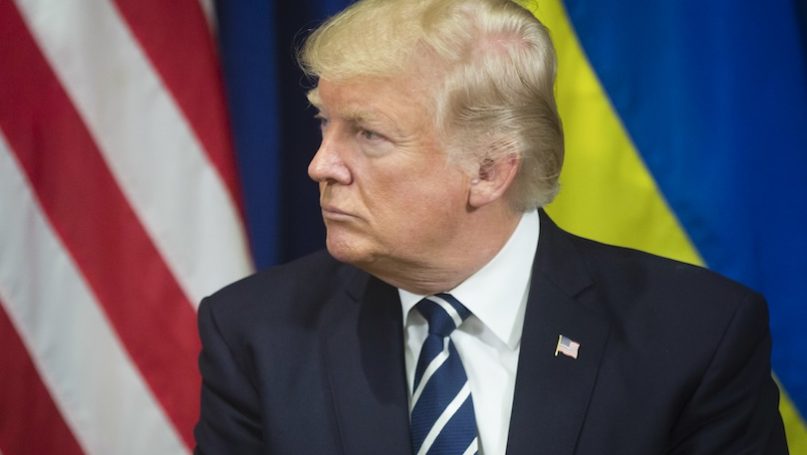
Drop of Light/Shutterstock
This past June, a young Ukrainian pastor lamented to me how a Republican presidential victory would end US military aid to his embattled nation. Examining this led me back to Reinhold Niebuhr, a Reformed Protestant minister from Missouri. Applying Niebuhr to current events is tricky. He sought American victory in World War II and the Cold War, but opposed US involvement in Vietnam. Yet, based on Niebuhr’s significant contribution to International Relations scholarship, I believe he would support arming Ukraine. Niebuhr argued that turning the other cheek is a Christian response to personal mistreatment, but turning a blind eye when an innocent nation is brutalized is not. Salvation would come from outside history, he wrote, but until then there is no law over nations, only between them.
An aggressive state can only be stopped by other nations, Niebuhr argued in the 1932 book that largely introduced his IR philosophy – Moral Man and Immoral Society:
The selfishness of human communities must be regarded as an inevitability. Where it is inordinate it can be checked only by competing assertions of interest; and these can be effective only if coercive methods are added to moral and rational persuasion.
Japan’s 1931 invasion of Manchuria was the catalyst for Niebuhr’s worldview. Russia’s 2022 invasion of Ukraine was similarly preemptive and brutal. Japan’s pretense was protecting Japanese in Manchuria and guarding against Western cultural and geopolitical encroachment. Putin has offered similar justifications for his invasion. The League of Nations and Kellogg-Briand Pact outlawing war could not stop the Japanese. Likewise, neither the United Nations nor the 1994 Budapest Memorandum – in which Russia committed to respect Ukraine’s territory if it gave up nuclear weapons – could dissuade Putin.
Although some were surprised by Putin’s full-scale invasion, a Moldovan pastor friend told me he was not because hubris and chauvinism so permeated Russian culture they were reflected in its leader. Thus Niebuhr’s “immoral society” was achieved. In 1944’s The Children of Light and the Children of Darkness Niebuhr explained that although all states act in self-interest there are distinctions. The “Children of Light” recognize they must be disciplined by a higher law, but the “Children of Darkness” recognize nothing above their own corrupt self-interest. Niebuhr feared a German and Japanese victory would damage the higher laws of Christianity and democracy. Today, victory by Moscow’s Children of Darkness would extinguish the Children of Light in the second-largest nation in Europe.
In 1991, author Phillip Yancey was in a delegation of American Christian leaders invited to help the disintegrating Soviet Union find a moral foundation. In the 2024 book What Went Wrong, Yancey and co-author John Bernbaum recount how after initial moves toward capitalism, democracy and freedom of religion, Russia relapsed into totalitarianism. In Yancey’s words: “The seeds of democracy have little chance to survive when the cultural soil is rock hard and soaked with the blood of its own people.” Yancey shifted his work to Ukraine and discovered more genuine plurality and a fierce independence shown in mass protests that ousted Moscow-backed governments.
For those who argue Ukraine is also corrupt, consider Niebuhr’s “non-Utopian liberalism”. In a New York Times opinion piece titled “Reinhold Niebuhr’s Long Shadow” Arthur M. Schlesinger Jr (1992) said Niebuhr persuaded him:
Original sin provides a far stronger foundation for freedom and self-government than illusions about human perfectibility … His warnings against utopianism, messianism and perfectionism strike a chord today. We cannot play the role of God to history, and we must strive as best we can to attain decency, clarity and proximate justice in an ambiguous world.
What of Niebuhr’s opposition to Vietnam? He explained in a 1969 interview with The New Republic that he feared America risked squandering the power and prestige won in WWII for a nation “incapable of either democracy or integral nationhood”. If we help Ukrainians maintain their nationhood, they have surely demonstrated through pro-democracy movements and overachievement in fighting Russia that they will keep it.
As for US foreign policy interests, the US now faces two great power adversaries in China and Russia. Ukrainians are willing and able to continue weakening the latter with weapons that we supply. Based on the record Niebuhr left of his philosophical journey, I believe he would want America to continue arming Ukraine. Because he would see it not as another Vietnam, but as Manchuria again. Consider in closing this quote from Niebuhr’s The Nation interview (2014), with Putin’s name substituted for Hitler’s:
If Hitler is defeated in the end it will be because the crisis has awakened in us the will to preserve a civilization in which justice and freedom are realities, and given us the knowledge that ambiguous methods are required for the ambiguities of history.
Further Reading on E-International Relations
About The Author(s)
Craig R. Myers worked as a reporter and editor for newspapers in Alabama and Florida for more than 25 years. A graduate of Troy University, he earned an MA in International Affairs from Middle Tennessee State University, where he works full time, teaches journalism part-time, and studies Russian. He frequently travels to Moldova and Ukraine for work with Christian NGOs. He is the author of War of the Words: The True but Strange Story of the Gulf Breeze UFO.
Before you download your free e-book, please consider donating to support open access publishing.
E-IR is an independent non-profit publisher run by an all volunteer team. Your donations allow us to invest in new open access titles and pay our bandwidth bills to ensure we keep our existing titles free to view. Any amount, in any currency, is appreciated. Many thanks!
Donations are voluntary and not required to download the e-book - your link to download is below.

 Movie
Movie 1 month ago
30
1 month ago
30 





![Presidents Day Weekend Car Sales [2021 Edition] Presidents Day Weekend Car Sales [2021 Edition]](https://www.findthebestcarprice.com/wp-content/uploads/Presidents-Day-Weekend-car-sales.jpg)



 English (United States)
English (United States)